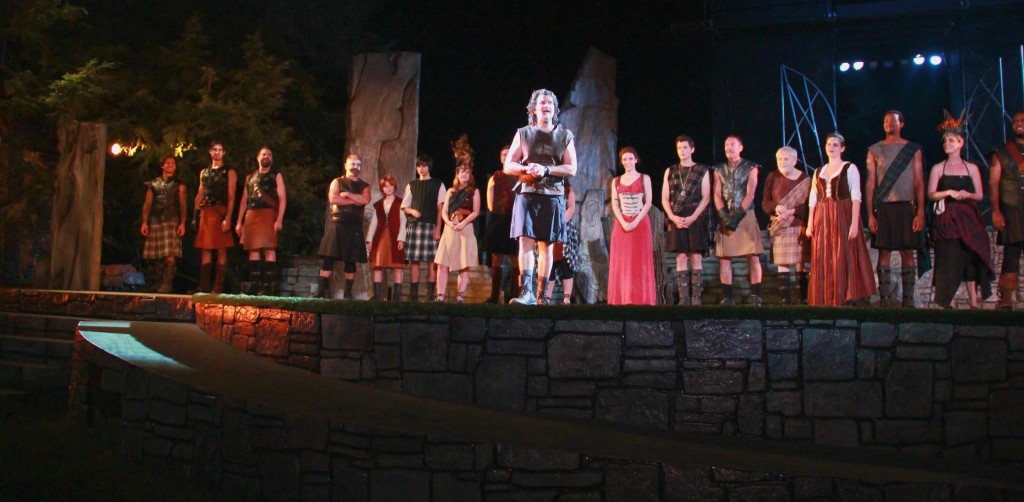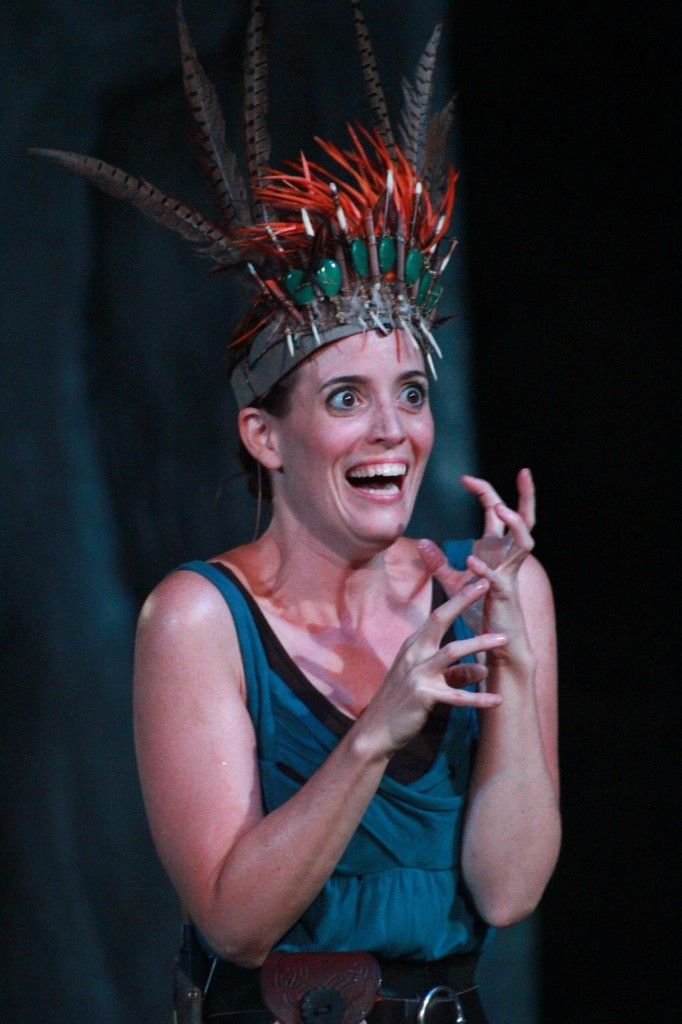
The company of Elm Shakespeare Company’s Macbeth in Edgerton Park, summer 2012. Photo by Mike Franzman, one of a vast and impressive album of Macbeth photos on Franzman’s Facebook site.
Macbeth
Through September 2 in Edgerton Park (Cliff St., along Whitney Ave., New Haven, traversing the Hamden border).
By William Shakespeare. Directed by Allyn Burrows. Set and Costume Designer/Wardrobe Supervisor: Elizabeth Bolster. Assistant Costume Design: Mike Floyd. Lighting Designer/Master Electrician: Jamie Burnett. Scenic Artist: Allison Jackson. Original Music/Soundscapes: Nathan Roberts. Sound Design Installation: Fred Santore (Horizon Sound). Sound Tech: Ivan (Horizon Sound). Lighting Design Installation: Luminous Environments LLC. Props Master: Kate Begley Baker. Fight Director: Ted Hewlett. Master Carpenter: Brandon Fuller.Production Stage Manager: Maria Cantin. Assistant Stage Manager: Emily DeNardo.
It’s a rare Macbeth that strikes you afterward as a mere walk in the park. This one has its grisly moments, making the most of the manners in which its supporting heroes and titular villain are dispatched. Yet those deaths, including a child, have an over-the-top, almost cartoonish quality to them.
Allyn Burrows’ production doesn’t seem nearly as dark as suspenseful as the last time Elm Shakespeare did Macbeth, about a decade ago. That previous production was directed by James Andreassi, who stars as Macbeth in this one. The Macbeth back then was Colin Lane, who serves as Macduff this year. The current director is Allyn Burrows, who will star as Macbeth himself when he stages the play later this year at the Actors Shakespeare Project in Boston.
Such a straightforward, realtively tame Macbeth stands out especially in a year when we experienced Eric Ting’s Macbeth 1969 at the Long Wharf, which reconstituted the text to suit a small cast and a stateside Viet Nam war nightmare concept. I was enthralled by Ting’s production, which subdued major speeches and brought to the fore some previously underappreciated textual flourishes. The Long Wharf show was also a technical powerhouse, with one grand special effect after another.
Elm Shakespeare, by contrast, doesn’t push the shocks and modern similarities and scary insanities. It’s a calculated piece of balanced entertainment which meets its audiences more than halfway.
I refuse to use the “T” word here— I don’t think Allyn Burrows is any more of a traditionalist than Eric Ting, and I reject the idea of a “traditional” or accepted way of doing Shakespeare. What tradition would we be talking about, anyhow? The half-millennium-old tradition? The 18th century academic tradition? The 19th century touring Shakespeare tradition, with ? The director-led “conceptual” tradition which consumes the entire 20th century? Elm Shakespeare’s Macbeth takes a little from each of those. It’s accessible. It’s entertaining. It makes strong interpretative choices, including some very bold ones and some curious ones. Its spectacle is largely in the size of its cast, which has enough men in it to suggest an army and enough women to redress the gender imbalance of a drama overwhelmed by three witches and a conniving wife.
Those witches, by the way, seem to emerge from some demented Sex in the City sequel. The sisters are more stylish than weird, dishing rather than brewing. It’s an interesting take, since it emphasizes the social aspects of Macbeth’s fish-out-of-water status in his climb from soldier to ruler.
The imaginative set places the play in an ancient setting, replete with runic carvings on menhir-like stones. It’s more convincing than the one for Elm Shakespeare’s Macbeth of a decade ago, in that it nicely intertwines the trees of the park with the fortresses and platforms of the stage, setting you up neatly for all the nature-stoked elements and various witchy incursions. (The last one had the shifting of Birnam Wood represented by a SWAT-like team swooping in on ropes and pulleys.) It’s a contemplative production. Andreassi underplays “Tomorrow and tomorrow,” but from a position of prominence at the topmost tower of the multi-storey set.
There are capable actors throughout the thing, but the casting is more interesting as a repertory company exercise. Elm Shakespeare has so many stalwarts now that it’s fun to see Lane—a country bumpkin in Measure for Measure—grind his teeth as Macduff, or the legendary Alvin Epstein—of the first New York production of Waiting for Godot, the longrunning cabaret revue An Evening of Brecht and Weill and a founding Yale Rep company member—get given the comic Porter part rather than, say, the King or one of the other more authoritative roles he’s usually given.
In all, this is a return to the heady early days of Elm Shakespeare, less concerning with an even tone or a consistent concept than in letting some game actors have a go at a fave text. Because it’s Macbeth, with its showy monologues and blistering showdowns and frenetic fight scenes, it works just fine.

